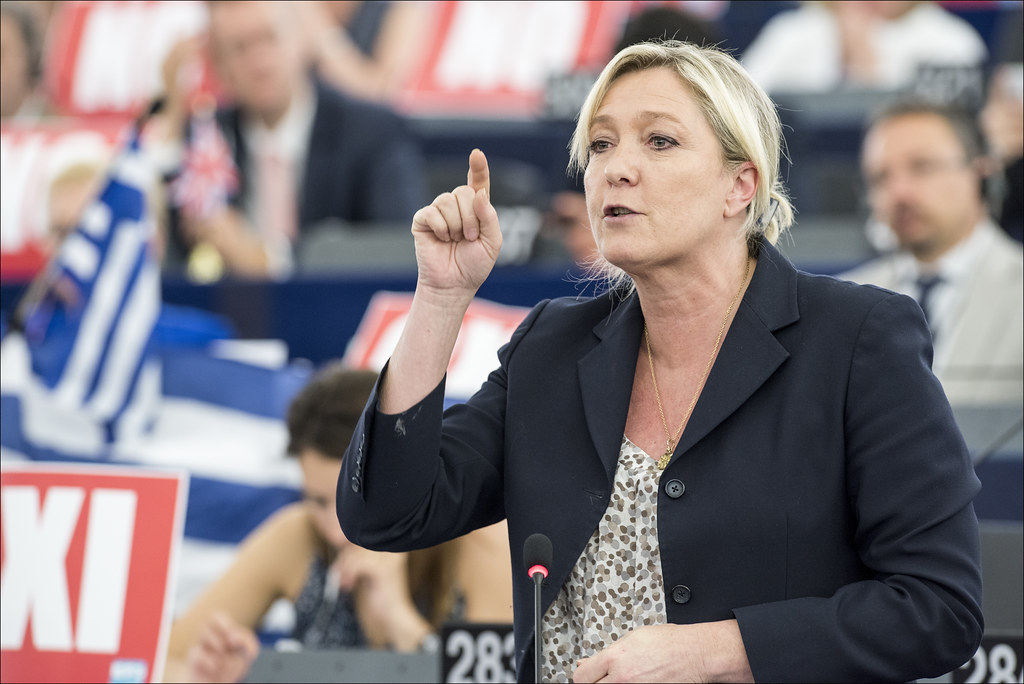PARIS (Transatlantic Today) – The two presidential contenders for France clashed during their only broadcast debate before Sunday’s 2nd round of voting.
In opinion surveys, far-right candidate Marine Le Pen has slipped behind centrist Emmanuel Macron, yet millions of people remain skeptical.
It didn’t take too long for the 2-hour-and-45-minute debate to get started.
On the cost of living, immigration, climate change, and Russia, the contenders tussled.
Around 15.6 million people tuned in to witness the discussion, in which Le Pen accused Macron of being a climate change hypocrite while Macron accused Le Pen of being reliant on Russian energy.
The campaign has been dominated by rising costs, which had taken the limelight in the debate.
When the two met in 2017, Macron was largely seen as the victor, since his opponent seemed nervous and unprepared. However during this debate, Le Pen was prepared and controlled from the beginning.
Macron was the one who was on the offensive all through the debate, acting more like a candidate than a leader and often interrupting his opponent.
According to Le Pen, 70% of French citizens think their living standard has declined in the last 5 years, and she is going to be the president of national unity and civic peace.
Macron stated that France has experienced extraordinary turmoil, beginning with Covid and ending with conflict in Europe. He had led France through all those difficulties and wanted to make the nation stronger.
Despite Le Pen’s great performance, a quick Elabe survey of respondents found that 59 percent of viewers believed Macron had won.
By a margin of 53 percent to 29 percent, the current president was viewed as the most presidential, while half of the surveyed believed he came off as arrogant. Marine Le Pen was marginally voted as being better in touch with ordinary people, despite the fact that half of the respondents considered her “worrying.”
The president’s problem was that, unlike in 2017, he now had to defend a record of success in office.
When challenged about his plans for a second term, he had no choice but to adhere to the monotonous approach of continuity. His rival might capitalize on the unavoidable failings of 5 years in office.
Despite this, the president never conveyed the impression that he was on shaky ground. His assaults on Le Pen on the Islamic headscarf, Europe, and the Russian funding were all well-received.
On the economy, he said that his already authorized policies to shield the French against inflation – a tax exemption on pay bonuses and a fuel price cap – have both been fairer and more successful than Le Pen’s plans.
And, for the most part, he prevented coming across as arrogant. He frequently gave the sense of wanting to push himself more forcefully on his adversary but trying to hold back.
For over 5 decades, televised debates between both the top 2 candidates have become a feature of the French presidential campaign, and they have proven most crucial when polls are tight.
After outperforming Socialist François Mitterrand in their debate in 1974, right-winger Valéry Giscard d’Estaing managed to defeat him. Mitterrand fared better during the 1981 rerun, winning the run-off poll.
It was the first occasion since that day that the very same contenders competed in 2 elections in a row.
Marine Le Pen suffered a major electoral setback as a result of the 2017 debate. The campaign is significantly tighter this time, and her impressive presentation might help her sway the hesitant voters.
Since the 1st round of voting, where the sitting president received 27.85 percent of the vote and Le Pen finished in #2 with 23.15 percent, the difference in opinion surveys has increased somewhat. However, they are still bouncing significantly, indicating that Macron will win around 53 to 57 percent of the vote.
Voters now have a much clearer alternative than they had 5 years ago, when Emmanuel Macron triumphed despite having no political experience.
Several voters were alienated by his stringent Covid regulations, and he was accused of operating as a “president for the rich.” Macron is much more strong in the major cities, but his pro-EU liberal and global vision has won him backing from other prominent right and left wing parties.
During the election campaign, Marine Le Pen dialed down her anti-EU jingoism, but her goal remains to renegotiate France’s alliance with the European Union, as she stated in the debate.


























